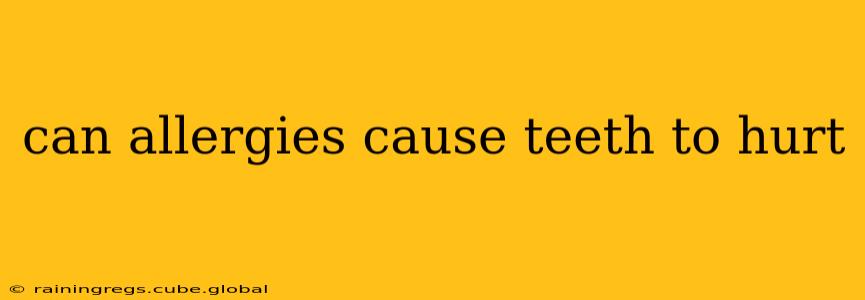Many people experience the discomfort of allergies, but the connection between allergies and seemingly unrelated symptoms, like tooth pain, is often overlooked. While allergies don't directly cause tooth decay or infection, they can trigger a cascade of events that lead to oral discomfort. This article will explore the possible links between allergies and tooth pain, helping you understand when to seek professional dental care.
How Allergies Might Indirectly Cause Tooth Pain
Allergies are the body's immune system overreacting to typically harmless substances called allergens. This reaction can manifest in various ways, including:
- Sinus Pressure: Allergic reactions frequently involve inflammation of the sinuses. Since the sinuses are located close to the upper teeth, significant sinus pressure can radiate pain into the teeth, mimicking a toothache. This is especially true with conditions like sinusitis, often associated with allergies.
- Temporomandibular Joint (TMJ) Issues: Allergies, especially those causing severe congestion or runny nose, can lead to increased jaw clenching and grinding (bruxism). This habitual clenching can put immense stress on the TMJ, the joint connecting your jaw to your skull, causing pain that might be felt in the teeth or jaw.
- Medication Side Effects: Some allergy medications, such as antihistamines, can have dry mouth as a side effect. Dry mouth reduces saliva production, which normally protects teeth from bacteria and acid erosion. The resulting decreased protection could increase sensitivity and lead to pain.
- Weakened Immune System: A prolonged allergic reaction can weaken the immune system, making you more susceptible to oral infections. These infections can certainly cause tooth pain. However, the allergy itself isn't the direct cause of the pain, but rather a contributing factor.
Can Food Allergies Cause Tooth Pain?
While not a direct cause, certain food allergies can indirectly contribute to tooth pain. For instance, an allergic reaction to a particular food might cause swelling in the mouth or throat, affecting nearby teeth. Furthermore, some allergic reactions could lead to nausea or vomiting, causing stomach acid to contact teeth, increasing sensitivity.
What Other Symptoms Might Accompany Allergy-Related Tooth Pain?
Differentiating allergy-related tooth pain from other dental issues is crucial. If your tooth pain is linked to allergies, you're likely to experience other allergy symptoms, such as:
- Runny nose and congestion: This is a classic sign of allergic rhinitis.
- Sneezing: Frequent sneezing episodes frequently accompany allergic reactions.
- Itchy or watery eyes: Eye irritation is another common allergic symptom.
- Headache: Sinus pressure from allergies often leads to headaches.
When Should I See a Dentist or Doctor?
If you experience tooth pain accompanied by allergy symptoms, consult your dentist and/or doctor. They can help determine the underlying cause of your pain and recommend appropriate treatment. Delaying treatment could worsen any underlying dental issue. Don't self-diagnose; professional guidance is essential for proper diagnosis and management.
Is it Possible for Allergies to Affect the Gums?
Yes, allergic reactions can sometimes affect the gums. Allergic gingivitis is a possibility, although less common than other allergy-related oral symptoms. This can manifest as inflammation and discomfort in the gums.
How Can I Prevent Allergy-Related Tooth Pain?
While you can't directly prevent allergy-related tooth pain, managing your allergies effectively can minimize the risk. This includes:
- Identifying and avoiding allergens: Knowing your allergens is the first step in prevention.
- Taking allergy medications as prescribed: Following your doctor's instructions on allergy medication is crucial.
- Maintaining good oral hygiene: Regular brushing and flossing are always important for oral health.
- Staying hydrated: Adequate hydration helps maintain saliva production.
In summary, while allergies don't directly cause tooth pain, they can trigger symptoms that indirectly lead to oral discomfort. If you experience tooth pain alongside allergy symptoms, consult your dentist and doctor for a proper diagnosis and treatment plan. Effective allergy management and good oral hygiene practices can help minimize the risk of allergy-related oral issues.
